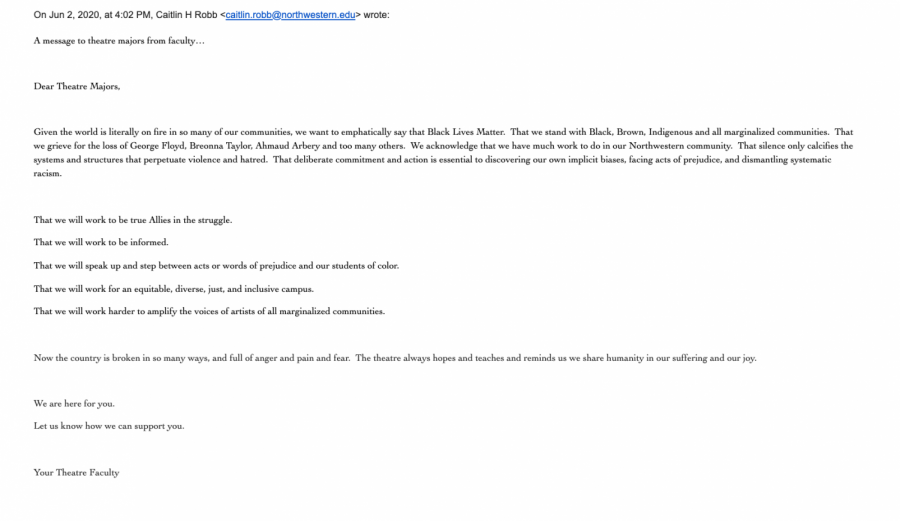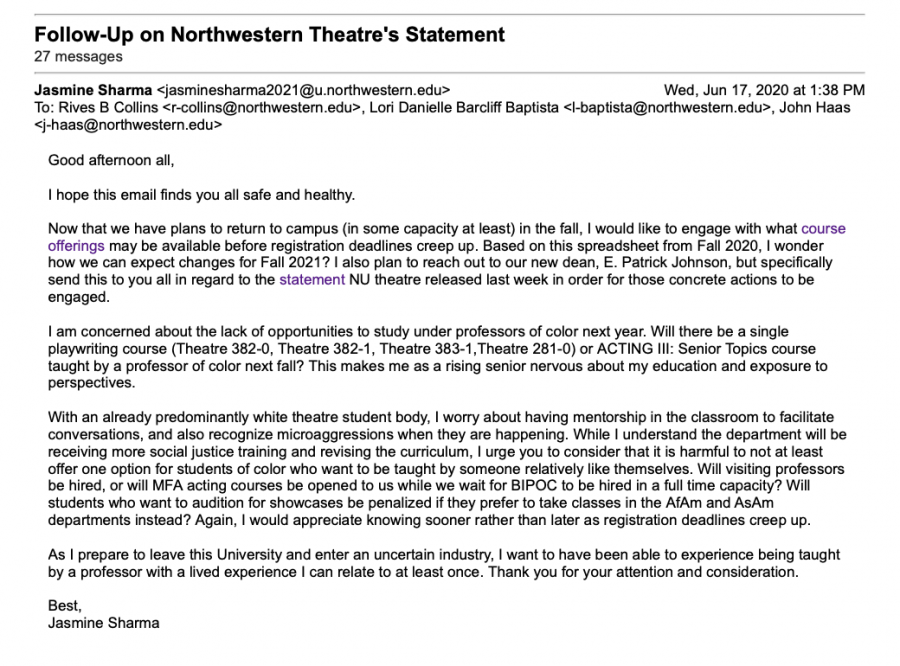Northwestern theatre students demand anti-racist action, accountability from department
Daily file photo by Catherine Buchaniec
The Northwestern Arch. Students said they have experienced racism and exclusion at every level of the Northwestern theatre department, from department and student shows to curriculum.
August 9, 2020
On June 2, just over a week after the killing of George Floyd, Northwestern theatre faculty issued a statement to theatre majors against racial violence. Grace Dolezal-Ng (Communication ‘20) opened the email in a late night, end-of-senior-year fog and immediately hit “reply.”
She called the actionless statement “virtue signaling” and, in her email, she asked what tangible steps the department was taking to combat racism.
“I have been waiting for four years to see tangible change in the NU theatre curriculum and operations,” Dolezal-Ng said in the email, “and would like to ask for there to be specific measures put in place to actively change the culture of this theatre program.”

A curriculum “built for white people”
These changes that some students have been waiting for come from a program rooted in white-centrism, Communication senior Nolan Robinson said.
“Our curriculum is made by white people,” Robinson said. “And you see that in everything that we learn with the playwrights that we read and the actors that we study and the modes of theatre in which we study.”
In her freshman year, Communication junior Emily Zhang took a theatre analysis class called “American Tragedy” in which only three of the 23 required texts were written by writers of color.
She also cited the all-white junior year acting curriculum which is currently split into three parts: Shakespeare, the Greeks and Chekhov. In its statement, the theatre department committed to amending this aspect of the curriculum.
While the department seeks to make changes, Zhang identifies its current thinking as stagnant because it is “grounded in this institution that is built for white people.”
Extracurriculars don’t do much better
One major component of the NU theatre education is the extensive extracurricular scene. But Communication senior Valen-Marie Santos said she feels that what she believes to be white-centric casting has made her miss opportunities.
During her time at NU, Santos said she played three or four Latinx grandmothers or mothers, a maid and several roles that were specified as Latinx. These roles comprised the “bulk” of her NU performance experience, she said.
“I felt like I couldn’t really flex my muscle as much as I would have wanted to, having studied theatre,” she said.
At the beginning of the summer, Zhang, sharing similar frustrations, created a document to send to the department in which she collected grievances from students of color. Here are some excerpts from the seven-page document:
— My acting class initially had a separate syllabus for POC students and white students;
— My PA of color gave me multiple warnings about how my race would affect auditions, specific instructors, and feeling like there was place for me in the department during Wildcat Welcome;
— I have only had one theatre instructor of color and she was a grad student. I’m a rising junior; and
— I worked with a director who confused me with the two other black men in the cast. He somehow managed to never fully learn my name despite being corrected for the entire course of the production, instead calling me by one of the other men’s names, a fusion of their names, or simply “you.”
While the department may be actively making changes, these changes may take time to implement. For seniors like Santos, it may be too late.
“I’m trying to come to terms with the fact that I may never see a Northwestern theatre department that doesn’t leave me feeling, to some degree, alienated,” Santos said.
Steps forward
After Dolezal-Ng hit “send” in the early hours of June 3, she opened a blank document on Google Drive and crafted an email template for other students to send to department leadership, calling for specific demands around curriculum, faculty hirings and more.
Less than a week later on June 8, the theatre department released a second statement. They included a list of anti-racist commitments, many of which were direct iterations of these student demands.
When the department failed to present concrete action follow-up weeks later, Communication senior Jasmine Sharma created another document on Google Drive, similar to the one created by Dolezal-Ng that sparked the efforts in the first place.
In that document Sharma created an email template with specific, fine-tuned demands for change. These included the previous demands for diversified curriculum and hirings, with specific questions geared to hold the department accountable to follow through.
Students led by Sharma sent another round of mass emails demanding evidence of changes. When the department responded with little concrete feedback, Sharma continued to press them, emphasizing that the students would not rest until they received concrete evidence of change.
And amid the flood of emails with little-to-follow-up, Communication senior Amy Prochaska reached out with a specific request.
Prochaska was funded through the Undergraduate Research Grant program to develop new standards of equity and inclusion for Northwestern theatre. Following the department’s statement, she reached out to extend the reach of her project and help the department streamline their commitments in response to student demands.
“Will you work with me this summer?” she wrote. “I don’t want this to be a passing moment – I want there to be a LEGACY, a long-term commitment to emerge from this moment of long-overdue realization. My peers deserve their education without having to provide one, too.”
Since then, Prochaska has been meeting regularly with the department. When Zhang sent the list of grievances to the department, she too became involved and the two have been working as part of the early stages of a student anti-racist task force.
The catch: Through the research grant, Prochaska is getting paid for her efforts. Others, who have invested time and energy pressuring the department and offering a plan of action, like Zhang and Sharma are not being compensated.
“Jasmine is doing this all through the kindness of her heart, the generosity of her time, and the tenacity of her spirit,” Prochaska said. “And a lot of other students are doing it too. And mostly students of color are spearheading this change.”
While Zhang and Prochaska said they have been making some headway with the department, University and School-specific regulations prevent them or the department from sharing them at this time.
The department declined to comment specifically, writing a uniform statement will be coming soon. The details are not public at this time.
What has remained an undercurrent through the whole summer was the impending start of E. Patrick Johnson as the new School of Communication dean.
Although Sharma and others had been copying him on email demands since June, he was not permitted to reply until his start date, Aug. 1.
On Aug. 2, Johnson sent an email to Sharma.
“Unfortunately, some of the changes that you and I want to see may not come to fruition in this coming year,” he said. “But it won’t keep me from trying! I’m only in my second day on the job, but here I am, on a Sunday morning, working. And I will not stop until I see material change in the school.”
Update: This article has been updated to reflect new information about the forms of activism Northwestern theatre students are using to advocate for their demands.
Correction: This article has been corrected to exclude information that was not explicitly consented to include in an effort to accurately reflect on the issues students say are driving their demands. The main photo was also updated to reflect the students’ work to change the department as a whole. The Daily regrets the error and is committed to providing as complete and representative coverage as possible.
Email: binahschatsky2022@u.northwestern.edu
Twitter: @BinahSchatsky
Related Stories:
— University administrators, student organizations respond to protests spurred by George Floyd’s death
— Students call for color-conscious casting at Northwestern
— Podculture: Radius Theatre Celebrates Latinx Artists on Campus




